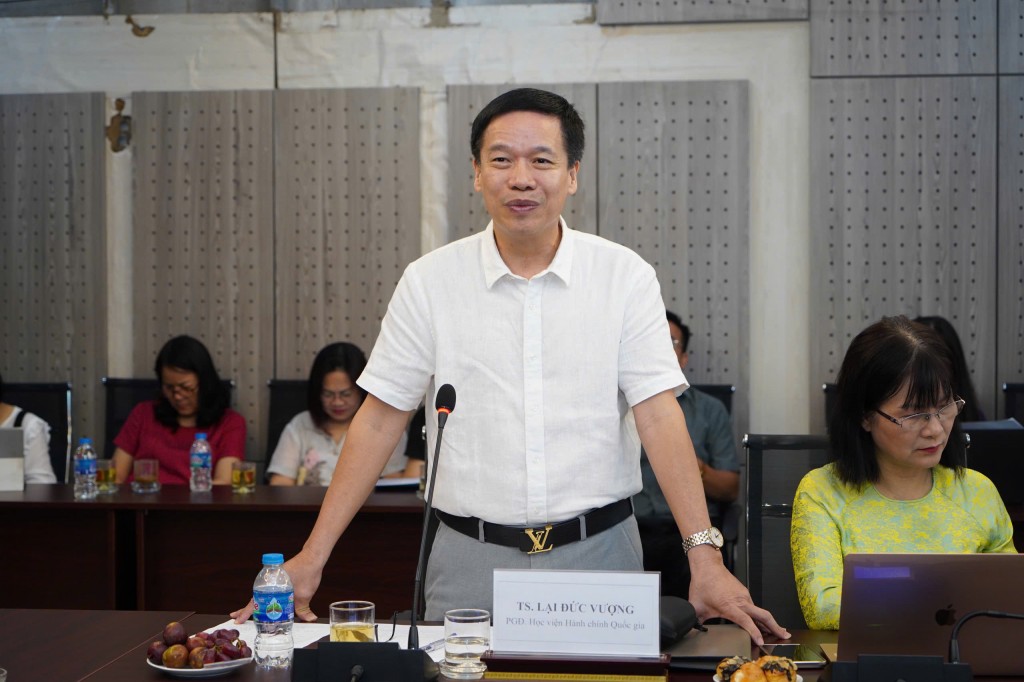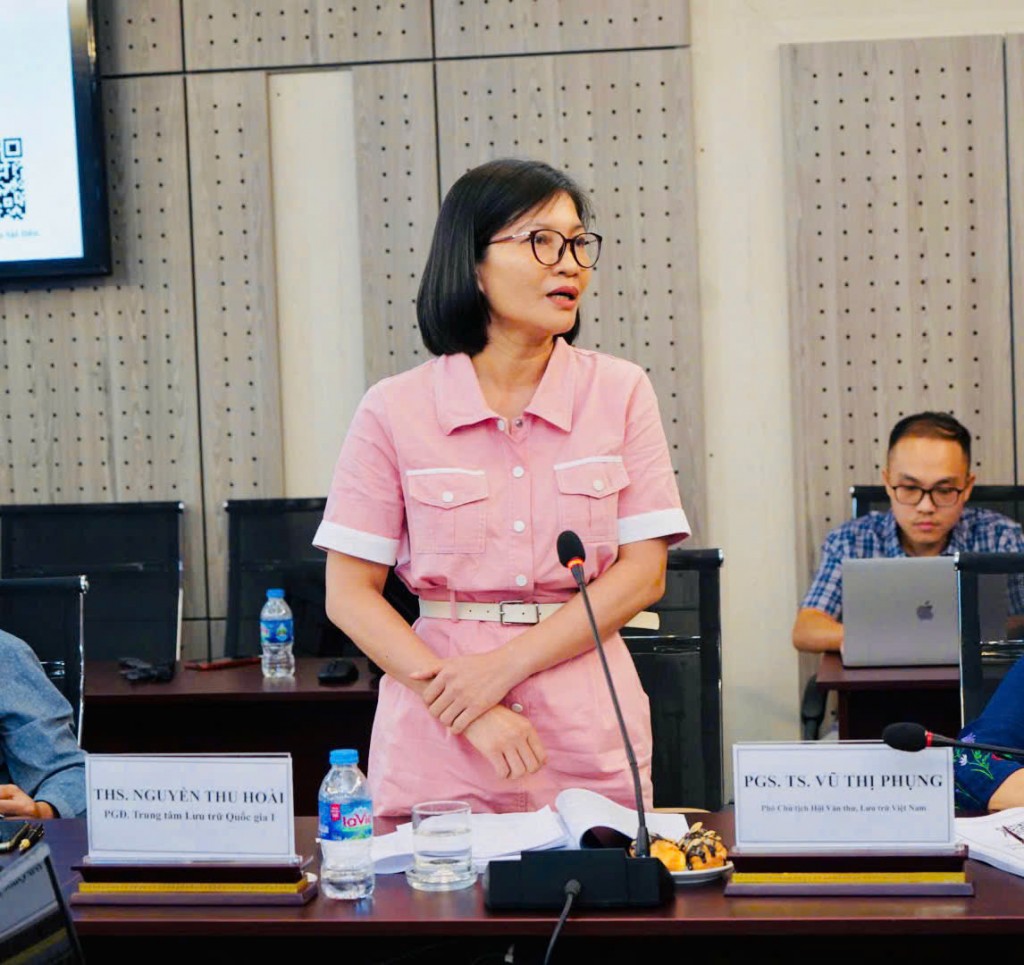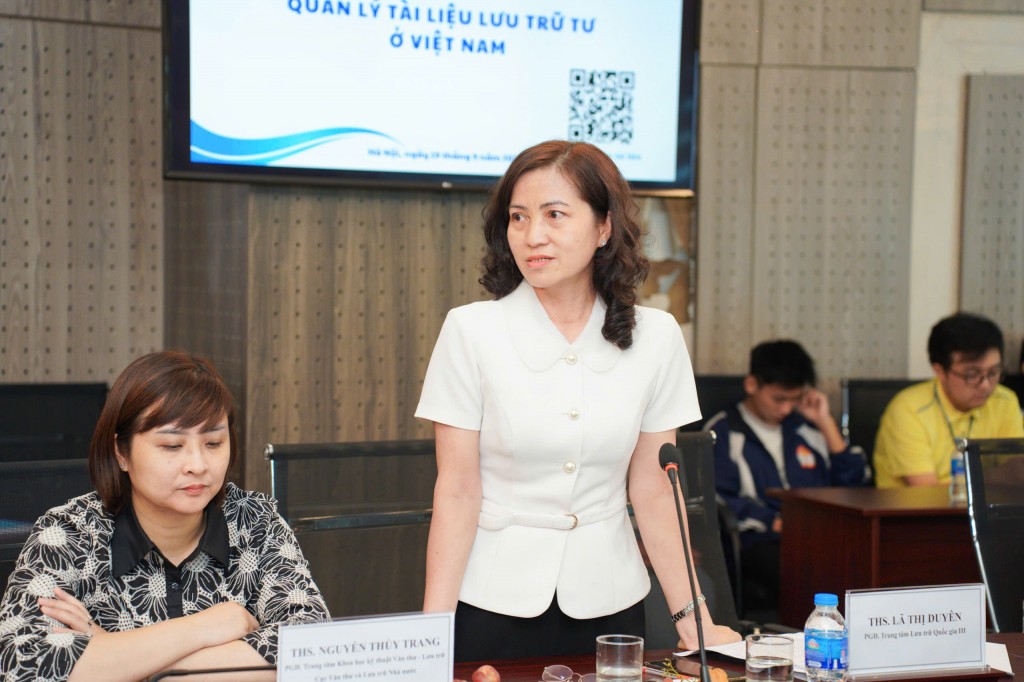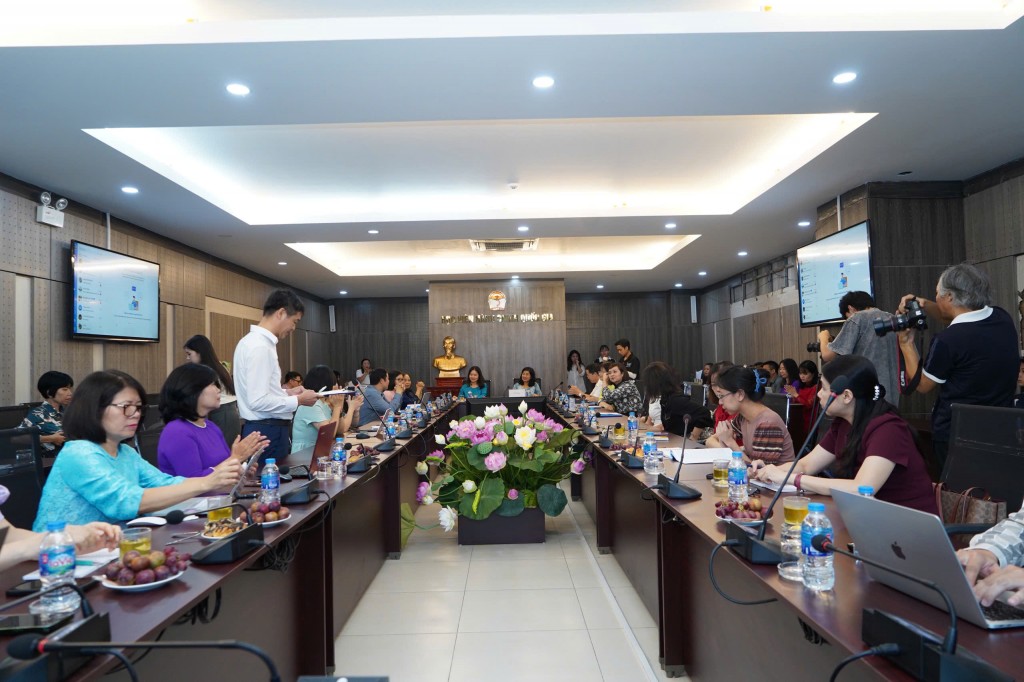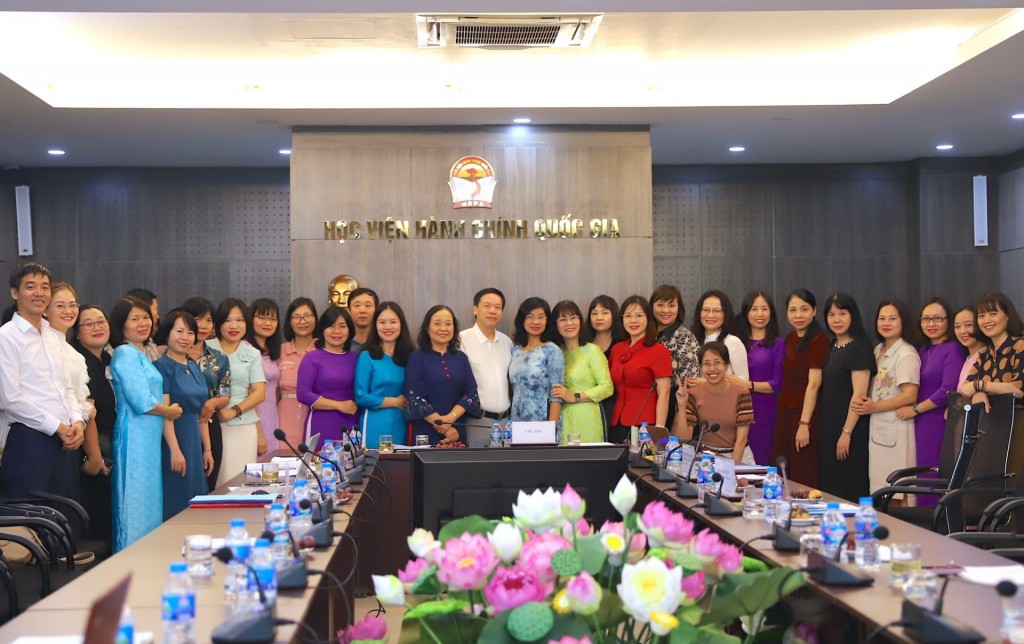On September 19, 2024, the National Academy of Public Administration (NAPA) held a workshop titled “Management of Private Archival Documents in Viet Nam,” organized by the Faculty of Archival Sciences and Office Management. The workshop was co-chaired by Assoc. Prof. Dr. Nguyen Thi Thu Van, Dean of the Faculty, and Dr. Tran Thi Loan, Deputy Dean of the Faculty.
Dr. Lai Duc Vuong, NAPA Vice President delivered remarks at the workshop.
Attendees included Assoc. Prof. Dr. Vu Thi Phung, Vice President of the Vietnamese Association of Records and Archives; Ms. Nguyen Thu Hoai, Deputy Director of the National Archives Center I; Ms. La Thi Huyen, Deputy Director of the National Archives Center III; Dr. Nguyen Huy Khuyen, Deputy Director of the Vietnamese Buddhist Documentation Center; Ms. Nguyen Thuy Trang, Deputy Director of the Office and Archives Science and Technology Center, State Records and Archives Department of Viet Nam; as well as lecturers and students from the Faculty of Archival Sciences and Office Management.
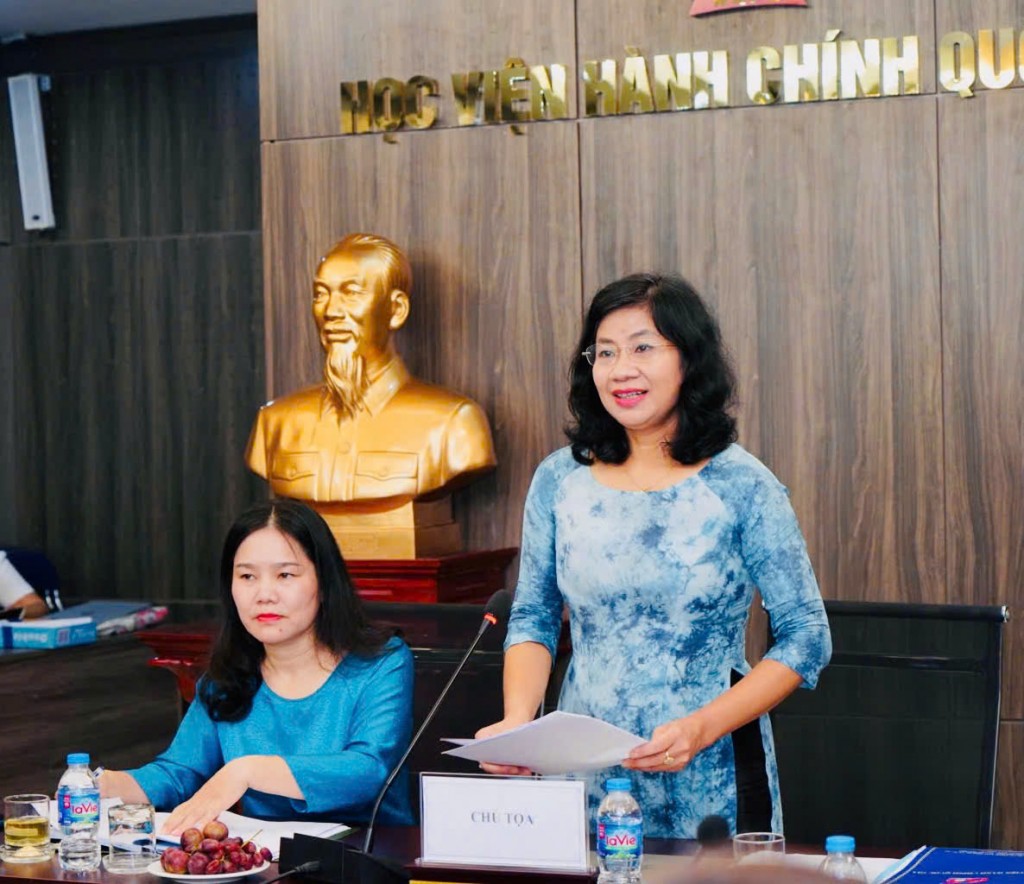
Assoc. Prof. Dr. Nguyen Thi Thu Van, Dean of the Faculty of Archival Sciences and Office Management, presenting at the workshop.
In her remarks at the workshop, Assoc. Prof. Dr. Nguyen Thi Thu Van, Dean of the Faculty of Archival Sciences and Office Management, emphasized that alongside archival documents generated from the activities of government agencies and organizations of the Party and State of Viet Nam, private archival materials from individuals, families, clans, communities, and organizations not assigned tasks by the Party or State of Viet Nam, reflect in a vivid and authentic way the history of a person, an organization, and, on a larger scale, the history of a nation or people. Regarding volume, private archival materials are extensive and diverse, reflecting the lives, work, and relationships of each individual, family, clan, community, and private organization. In terms of format, due to the diversity of entities (private) and the unique process of document creation, private archival materials come in various formats, materials, and sizes, without adhering to a single uniform standard. Therefore, private archives can include paper documents, audiovisual materials, electronic records, and information stored on other media. Regarding content and value, private archival materials are created through the activities of individuals, families, clans, communities, and private organizations over different historical periods and political regimes. These materials are recognized as part of Viet Nam’s National Archives. At the same time, private archives have value in scientific, historical, cultural, political, economic research, and intellectual property, serving as compelling legal evidence related not only to individuals, families, clans, communities, and private organizations but also to the nation and people. For the state management of private archives, competent state agencies have issued several legal documents on archival management, such as the 2011 Law on Archives, Decree No. 01/2013/ND-CP dated January 3, 2013, detailing certain provisions of the 2011 Law on Archives, and the 2024 Law on Archives (effective from July 21, 2025). These legal documents have established an important legal framework for managing private archival materials. To improve the quality of training and to meet the increasing demands of society, and as part of the 2024 work plan assigned by the NAPA President, the Faculty of Archival Sciences and Office Management is organizing the workshop with the theme: “Management of Private Archival Documents in Viet Nam”.
Assoc. Prof. Dr. Nguyen Thi Thu Van also suggested that the attending scholars focus on discussing the following key topics:
(1) Theoretical and legal issues regarding the management of private archival documents.
(2) The current status of private archival document management.
(3) Solutions to improve the efficiency of private archival document management.
In his remarks at the workshop, Dr. Lai Duc Vuong highly appreciated the timeliness and scientific value of the workshop topic. He expressed hope that the participants would actively contribute their insights, presenting multi-dimensional discussions from theoretical perspectives, research practices, and current management status, while proposing practical solutions to enhance the efficiency of managing and utilizing private archival materials. This would help open up opportunities to access, preserve, and promote the value of private archival documents—a valuable resource outside of the public archival collection in Viet Nam today.
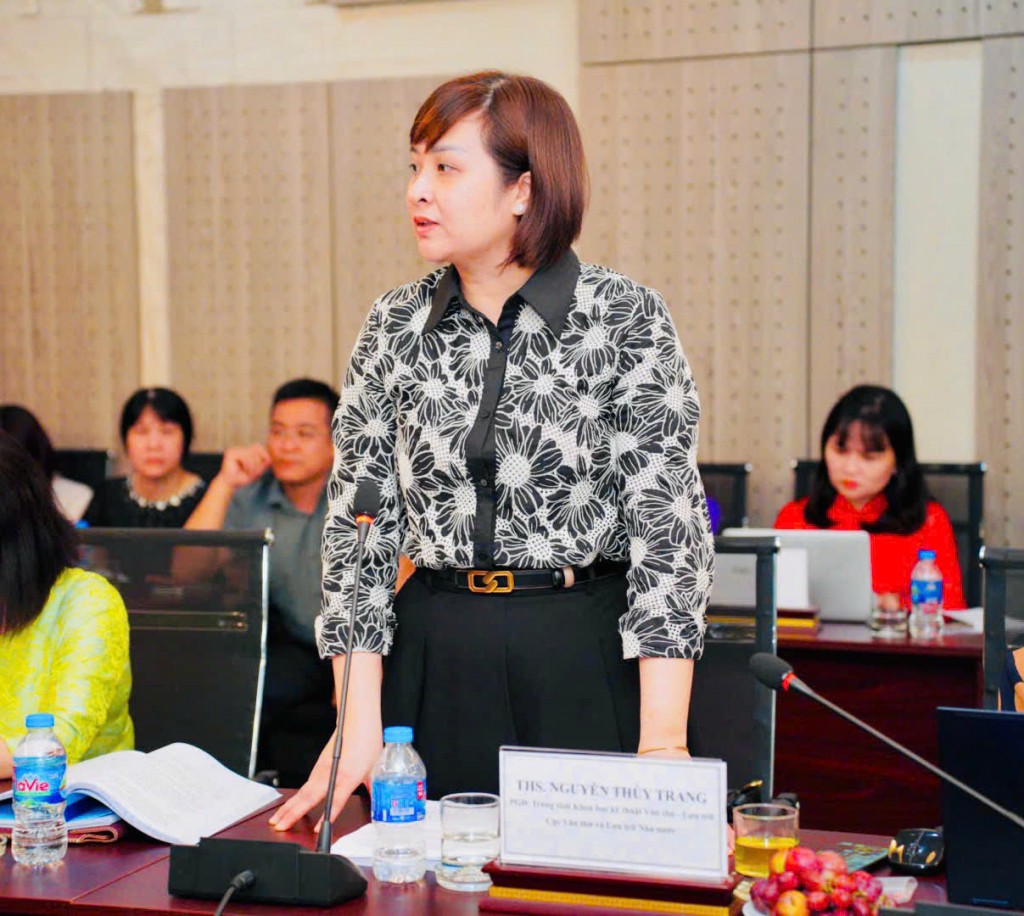
Ms. Nguyen Thuy Trang, Deputy Director of the Office and Archives Science and Technology Center, State Records and Archives Department of Viet Nam, at the workshop.
In her presentation at the workshop, Ms. Nguyen Thuy Trang, Deputy Director of the Office and Archives Science and Technology Center, State Records and Archives Department of Viet Nam, affirmed that the regulations on private archives outlined in the 2024 Law on Archives have contributed to raising societal awareness of the protection, preservation, and utilization of private archival materials to serve the interests of individuals, organizations, communities, and the nation. The state’s policies reflect respect for, protection of, and assurance of ownership rights concerning private archives. Furthermore, the regulations on private archiving establish a legal framework and favorable conditions for promoting the socialization of archival activities, aiming toward building an archival society. The provisions of the 2024 Law on Archives ensure the rights of owners to actively and creatively manage their archival documents while balancing state management and harmonizing the relationship between the state and organizations, individuals, families, clans, and communities.
Ms. Nguyen Thu Hoai, Deputy Director of the National Archives Center I, acknowledged that the inclusion of private archives as part of Viet Nam’s National Archives reflects the progressive and up-to-date nature of the 2024 Law on Archives. Her presentation focused on (1) Key updates in the 2024 Law on Archives; (2) Provisions related to private archives and their management; (3) The current status of managing, utilizing, preserving, and promoting the value of private archives, as well as the recognition of rare, valuable, and particularly significant documents.
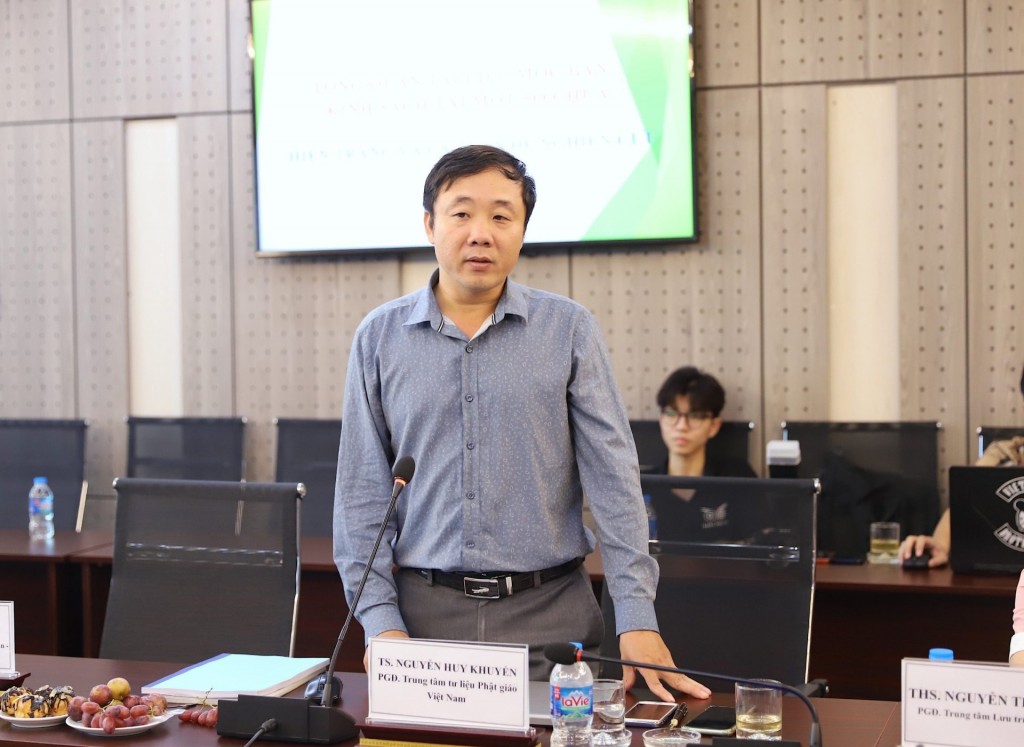
Dr. Nguyen Huy Khuyen, Deputy Director of the Vietnamese Buddhist Documentation Center, at the workshop.
Dr. Nguyen Huy Khuyen, Deputy Director of the Vietnamese Buddhist Documentation Center, delivered a presentation titled “Overview of woodblock scriptures in several pagodas.” He emphasized that collecting, preserving, and utilizing the woodblock archives of Buddhist scriptures will bring substantial benefits across many areas, contributing to the spread of Buddhism and preserving the nation’s cultural traditions and values. However, he pointed out that many pagodas, which house these woodblocks, have not been adequately cared for, leading to damage from termites, rot, cracking, and rodent gnawing, which is detrimental to the documents. Based on field surveys conducted at these pagodas, he stressed the need to organize research, cataloging, indexing, digitization, and preservation according to archival standards to extend the lifespan of this unique documentary heritage. Many significant woodblock scripture collections in various pagodas also require evaluation by relevant authorities to support their preservation and utilization. He recommended that the Buddhist scripture woodblocks be included in the list of archival documents, with policies in place for their collection, preservation, and research. Moreover, he suggested developing policies to archive copies or digital versions of these scriptures and related materials at pagodas in both historical and national archives to facilitate preservation and research efforts.
Ms. La Thi Huyen, Deputy Director of the National Archives Center III, stated that private archival work is essentially the development and refinement of personal, family, and lineage document archiving. Based on practical experience at the National Archives Center III, she discussed both the advantages and challenges of implementing the collection of private archival documents. She proposed several solutions to enhance the effectiveness of private archival collection, including: (1) Developing and implementing collection plans; (2) Improving and enhancing staff quality; (3) Strengthening collaboration with agencies, organizations, and individuals; (4) Proactively suggesting and proposing the development of document collection projects; and (5) Consolidating the team of archival inspection staff.
The workshop received more than 20 presentations, along with numerous high-quality discussions and professional exchanges from scientists, managers, experts, and lecturers within and outside NAPA. These contributions helped to clarify issues related to private archives and the management of private archival documents, leading to the development of scientific and comprehensive solutions aimed at improving the state’s management of private archival materials.
In her closing remarks, Assoc. Prof. Dr. Nguyen Thi Thu Van expressed her gratitude to the delegates, esteemed guests, scientists, managers, and experts from the University of Social Sciences and Humanities (Vietnam National University, Ha Noi), the State Records and Archives Department of Viet Nam, National Archives Centers I and III, the Museum of Vietnamese Scientists’ Heritage, the Vietnamese Buddhist Documentation Center, as well as lecturers, researchers within and outside NAPA, colleagues, and students for their continuous support of the workshop. She emphasized that the discussions and exchanges at this scientific forum would serve as valuable resources for the workshop organizers to further revise, update, and integrate into academic research and the teaching of courses related to private archival management in the academic programs at the Faculty of Archival Sciences and Office Management at NAPA. Moreover, the outcomes will provide valuable reference materials to help the state’s archival management agencies issue better implementation guidelines for the 2024 Law on Archives.


